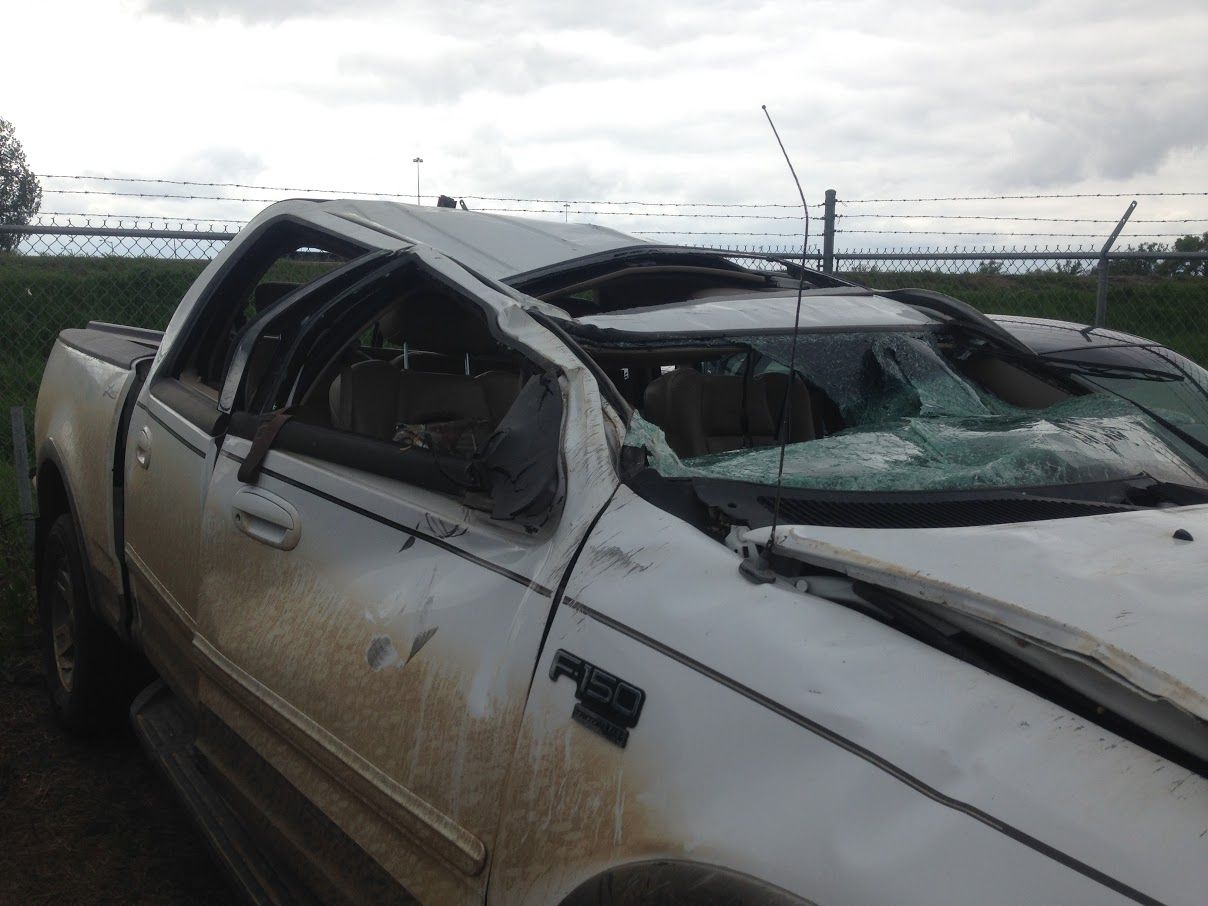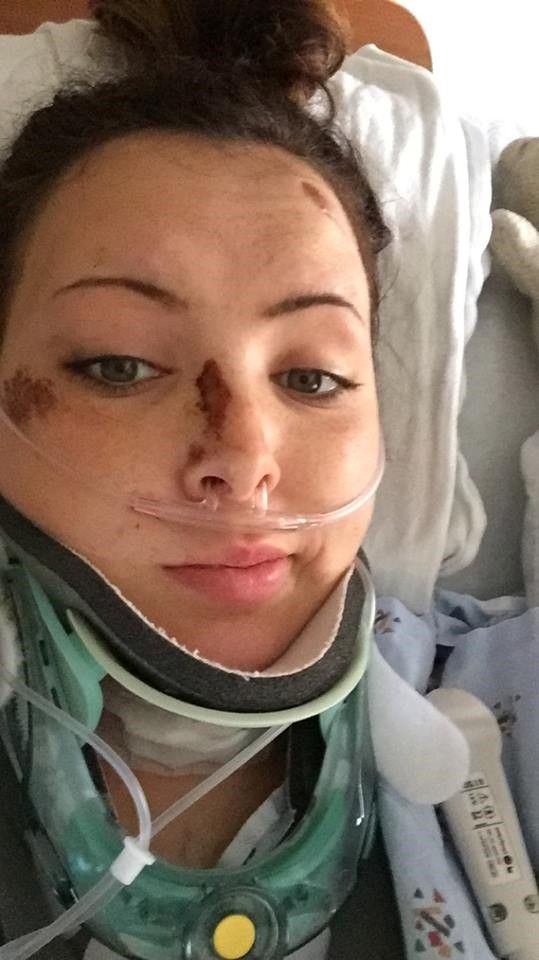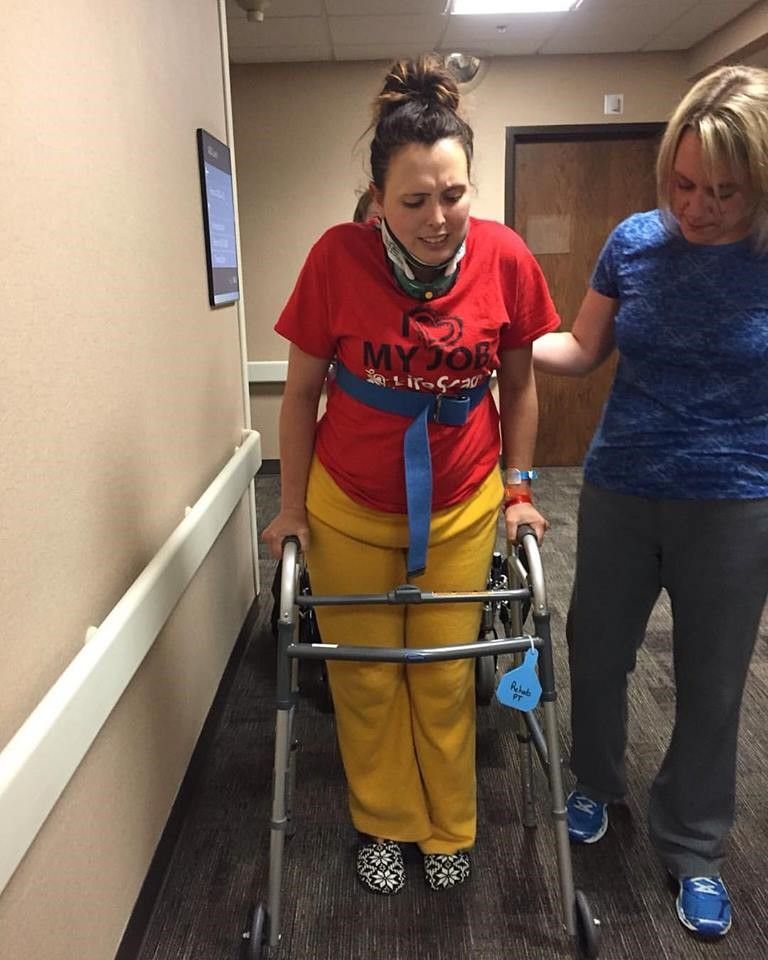Disbelief, disappointment, humiliation.
The officer had seen the elementary school teacher swerving in and out of her lane and had pulled her over. Grogan admitted she had been texting while driving, and the officer wrote her a $120 ticket.
“That was utterly embarrassing after going through something like I went through,” Grogan said.
Incredibly, her near-death experience in a crash caused by texting behind the wheel hadn’t deterred her from repeating the practice.
But getting the traffic ticket last fall did have an upside. It led to an epiphany for Grogan, a moment of clarity in which she finally had to admit something about herself: that she is addicted to texting on her cell phone.
Barely escaping death
The last thing Grogan remembers of a fateful Friday in May, 2016 was the feeling of floating. In that moment, her body was free, whole and unbroken. At just 23, her future was limitless.
But now she was in peril. After checking a text message that turned out to be a good morning wish from her boyfriend, Grogan lost control of her Ford pickup while driving 50 mph on a gravel road near Hartford.
Without a seatbelt to hold her in place, her body endured a second or two of inertia as the truck dove down into a ditch, then flew back out onto the road. Grogan remembers “sort of raising up” just before the truck left the road once again and descended into a horrific series of jarring rolls.
Grogan was thrown from her pickup and landed 70 feet away in a farm field. As luck or fate would have it, a medical professional passing by saw the wrecked vehicle and came to Grogan’s rescue. He stabilized her as best he could and called for help. Grogan was taken to a hospital in Sioux Falls.

The accident ravaged Grogan inside and out, from top to bottom.
She had a concussion and broke her neck in two places. She broke her femur and fractured her hip in three spots. The small bones that extend off the vertebrae in her back were sheared off and four vertebrae were fractured. She suffered road rash on her back, which caused nerve damage.
An artery near Grogan’s hip was damaged, her kidney and spleen were torn, and her liver was almost completely severed. More than half her blood leaked into her body cavity.
“I had several injuries that should have killed me or left me paralyzed or brain dead or a vegetable,” Grogan said.
The accident happened on her father’s birthday. When he arrived at the hospital, the prognosis was not good. “That still gets me, Grogan said, “that my dad was met by a priest at the emergency room door on his birthday.”

Long road back
Grogan underwent six surgeries, first to save her life, and then to repair her broken bones with numerous plates, pins, rods, coils, screws – even a cadaver bone. She had painful therapy, and suffered from post-traumatic stress disorder, depression and anxiety, which have waned but still lurk within her.
Grogan said her medical bills were well over $500,000, and that her mother spent 18 months navigating the complex insurance system.

Now 25, Grogan has relearned to walk and is only occasionally in pain. She has returned to her job as an art teacher in the Mitchell school system and has a new boyfriend. She makes frequent trips to Brandon to visit her family.
During her recovery, Grogan reflected often on her deep faith, her affection for her family, her joy at working with children, and her sudden appreciation of sunsets.
But even after all the pain and trauma Grogan endured, and her deeper gratitude for the little things in life, Grogan now admits the accident alone was not enough to overcome her compulsion to text while driving.
“I had several injuries that should have killed me or left me paralyzed or brain dead or a vegetable.” - Cassondra Grogan
Receiving the traffic ticket for texting, she said, must be the wake-up call that leads her to safer behavior behind the wheel.
“Straight up, I said to the officer, ‘Yes, I was texting,’ and that I deserved the ticket because I was endangering myself and others,” Grogan said. “It illustrates the fact that texting and driving is an addiction, just like drinking and driving but worse because not everyone has a drinking problem, but everyone has a phone.”
Sharing her story
Grogan has since committed to fighting the urge to text while driving, and she’s taken steps to ensure she complies. She has a hands-free holder on her dashboard for her cell phone, and programs it so people who contact her are made aware she is unavailable because she is driving. She always wears her seat belt.
Grogan also tries to warn others of the dangers of texting while driving by frequently telling the story of her wreck. She’s given a couple public presentations and has shared photos of her wrecked pickup and the X-rays of her broken body with the more mature students she teaches.
Grogan says she supports a pair of measures proposed in the South Dakota Legislature to upgrade texting while driving and not wearing a seat belt to primary offenses, allowing police to pull over a driver for those offenses alone. “They only want to put this in place to save people,” she said. “It would make people more aware if they kept getting pulled over.”
The seat belt measure died in a House committee, while the texting measure was passed by the House and is now being considered in the Senate.
But Grogan, who got her first cell phone at 14, is not hopeful that a law will stop some drivers, especially young people, from making poor choices. She said her generation and the one coming next are more electronically inclined and more attached to their phones than many people can imagine.
Even after hearing Grogan’s story, her friends still text while driving, sometimes when Grogan is in the car. Grogan sometimes receives Snapchat photos from friends she knows are driving. And Grogan’s elementary students, some whom already have cell phones, have their own fears about texting and driving.
“I remember one of the younger ones saying, ‘I’m surprised I haven’t died because my mom texts and drives all the time,’” Grogan said. “That was really heart-wrenching to hear, because if you’re doing it in front of your kids, you’re basically telling them that it’s OK, and you expect them to do it too when they are older.”
All Grogan can do now, she said, it to be safe herself, and try to set a good example for others in her life and the children she works with.
“You don’t think it will happen to you until it does,” she said. “As part of my healing process I think to myself, ‘Hey, this happened,’ but I’m getting to the point where I say, ‘Hey, I’m not going to do this anymore.’”



